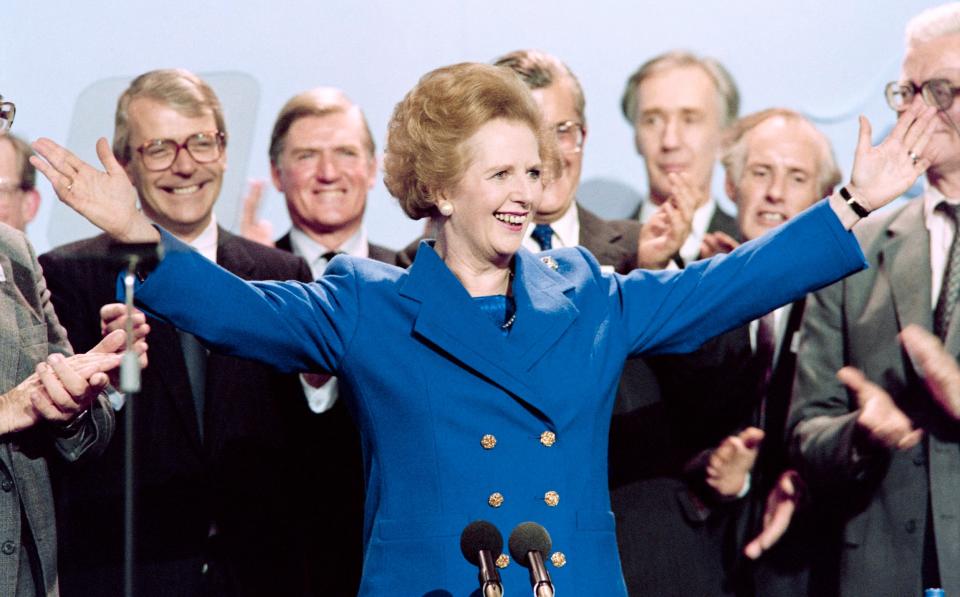Maurice Saatchi wants to give you an ‘orgasm of the mind’

- Oops!Something went wrong.Please try again later.
There is no doubt that Maurice Saatchi, Lord Saatchi – famously the co-founder with his brother of the advertising agencies Saatchi & Saatchi and M&C Saatchi, where he was the architect of various Conservative Party advertising campaigns, as well as being a former co-chairman of the party, a governor of the LSE, and a campaigner for reforms in medical research – is a remarkable individual. He is by no means a run-of-the-mill sort of a chap. And he does not write run-of-the-mill sort of books: his recent Do Not Resuscitate (2022) was a memoir presented as a thought experiment, but which was really an outpouring of grief, in which he imagined himself trying to gain entry into heaven, wishing to be reunited with his wife, the writer Josephine Hart, who died of cancer in 2011.
Orgasm is another very peculiar outpouring. It is not a book about physical orgasms, which is probably for the best. Instead, it’s a book about what Saatchi calls “intellectual” orgasms, the “orgasm of the mind”, “that divine moment of revelation for which we wait and pray” and which he claims is “the only cure” for “the torments of a complicated human life”. Orgasm attempts to provide the “intellectual excitement” to bring about such extraordinary revelations.
In order to excite the reader, Saatchi proposes 21 examples of “things people say – all well-known and widely accepted” but which he claims are all lies. He then attempts to reveal the actual truth about them. Saatchi’s counter-statements and arguments range from the provocative to the ridiculous. In answer to the statement “The NHS Is Brilliant” he answers “Claptrap! It’s only for those who cannot afford to go private […] The NHS now is the ultimate post-truth world: fake news and alternative facts.” “Russia Is Bad”? He responds, “Actually, Russia is just bad at propaganda.” “Cocktail Parties Are Stressful? Drivel! Stick with me, suckers. I’ll save you.”
In support of his contentions, he marshals evidence from the writings of the great, the good and the not-so-good, including Plato, Aristotle, Freud, Marx, Lenin, Isaiah Berlin, and dozens of others. One chapter (“Words Are Just Talk”) consists entirely of long quotations from the Sermon on the Mount, the American Declaration of Independence, and The Communist Manifesto. He also quotes widely from his own previous work, including interviews, articles and published remarks, displaying a marked tendency towards both the truly tendentious and the bleeding obvious: taxation is part of the UK government’s conspiracy to “reduce people’s independence, increase their dependence on the state, and restrict people’s natural, human desire for self-determination”; “what we weak creatures can do is accept the uncomfortable fact that much of what seems true to us is governed by our own perceptions.”
It’s like listening to a brilliant and charming but rather inebriated dinner guest. Consistency is not his forte. At times it’s like reading the raging of some post-capitalist theorist: “The unintended consequence of globalisation was cartelisation.” At others it sounds awfully like big business boasting: he happily recounts, for example, how he became part of the “new global order” in his work for Procter & Gamble.

There are constants throughout the work, however, and some consolations: his many memories of Mrs Thatcher, for example, which offer him solace, though “something has gone terribly wrong with Mrs Thatcher’s idea of the free market”, he laments. “It was meant to be a perpetual referendum. People would cast their vote every day, and from the competition to win their custom, better products and services would emerge. Unfortunately, it hasn’t worked out like that.”
In a chapter in which he addresses accusations that he was at least partly responsible for ruining British politics with his negative sloganeering ad campaigns, he boldly claims that he was doing God’s work: “I spoke for Jesus.” He quotes the Gospel of Matthew: “Think not that I am come to send peace on earth: I came not to send peace, but a sword.” Mixing his martial metaphors, he goes on: “Politics is a contact sport: hit or be hit. […] You’re in a boxing ring. Your opponent has hit you in the face. There is only one thing to do now: land a blow on your opponent’s chin that knocks them out.”
Mixing things up even further, and making it even murkier, the book concludes with a screenplay, “Men Are Awful”, about a wife and a mistress who plot the grisly murder of a philandering husband.
Bullish and occasionally bizarre, Orgasm is not so much a book as a series of entertaining hot takes; ejaculations rather than arguments. Which is perhaps what he intended.
Orgasm is published in the USA this month by Eris at $100.00; a UK edition is forthcoming later this year

